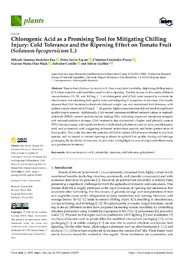Título :
Chlorogenic Acid as a Promising Tool for Mitigating Chilling Injury: Cold Tolerance and the Ripening Effect on Tomato Fruit (Solanum lycopersicum L.) |
Autor :
Madalina Ilea, Mihaela Iasmina
Zapata, Pedro Javier
Fernández-Picazo, Christian
Díaz-Mula, Huertas María
Castillo, Salvador
Guillén, Fabián |
Editor :
MDPI |
Departamento:
Departamentos de la UMH::Tecnología Agroalimentaria |
Fecha de publicación:
2024 |
URI :
https://hdl.handle.net/11000/38381 |
Resumen :
Tomato fruit (Solanum lycopersicum L.) has a very brief storability, displaying chilling injury
(CI) when stored in cold conditions used to delay ripening. For this reason, in this study, different
concentrations (10, 50, and 100 mg L−1
) of chlorogenic acid (ChA) were assayed to evaluate its
effectiveness in maintaining fruit quality traits and mitigating CI symptoms in tomatoes. Our results
showed that ChA treatments effectively delayed weight loss and maintained fruit firmness, with
optimal results observed at 50 mg L−1
. In general, higher concentrations did not result in significant
quality improvements. Additionally, ChA-treated tomatoes exhibited reduced values in malondialdehyde (MDA) content and electrolyte leakage (EL), indicating improved membrane integrity
and reduced oxidative damage. ChA treatments also maintained a higher total phenolic content
(TPC) during storage, with significant levels of individual polyphenols such as rutin, neochlorogenic
acid, and p-coumaric acid, suggesting enhanced antioxidant capacity and better preservation of
fruit quality. This is the first time the potential of ChA to reduce CI has been evaluated in any fruit
species, and its impact in tomato ripening is shown to uphold fruit quality during cold storage,
prolonging the storability of tomatoes. In particular, we highlight its natural origin and effectiveness
as a postharvest treatment.
|
Palabras clave/Materias:
Solanum lycopersicum L.
storability
cold tolerance
polyphenol |
Área de conocimiento :
CDU: Ciencias aplicadas |
Tipo de documento :
info:eu-repo/semantics/article |
Derechos de acceso:
info:eu-repo/semantics/openAccess |
DOI :
https://doi.org/10.3390/plants13152055 |
Publicado en:
Plants 2024, 13, 2055 |
Aparece en las colecciones:
Artículos Tecnología Agroalimentaria
|
 La licencia se describe como: Atribución-NonComercial-NoDerivada 4.0 Internacional.
La licencia se describe como: Atribución-NonComercial-NoDerivada 4.0 Internacional.
.png)
